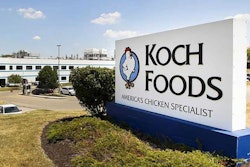
Sanderson Farms Inc., the third largest chicken company in the United States, will likely be combined with Wayne Farms LLC to create what will be the third-largest integrated chicken company in the country.
$4.53 billion purchase
In August 2021, a joint venture of Cargill and Continental Grain Co. (Conti), two of the largest, privately owned agriculture companies in the world, reached a definitive agreement to buy Sanderson Farms Inc. for $203 per share in cash, or about $4.53 billion. If the transaction is approved, it will create a new, privately owned chicken company capable of processing more than 143 million pounds of ready-to-cook chicken (RTC) on a weekly basis. The deal is expected to close by the end of 2021 or early 2022.
In October 2020, Sanderson rebuffed a $3 billion offer from Durational Capital Management. At the time, it said the offer substantially undervalued the company and its prospects. In 2015 and 2016, Wayne Farms – owned by Conti – withdrew from initial public offerings.
According to an August 9, 2021, joint release from Sanderson, Cargill and Conti, when the deal closes Cargill and Conti will combine Sanderson Farms with Wayne Farms, a subsidiary of Conti, to form a new, privately owned integrated poultry company. The new company is to be led by Wayne Farms Chief Executive Officer Clint Rivers.

According to data from the 2021 edition of WATT Global Media’s annual Top Broiler Companies survey, had Wayne Farms (the seventh-largest company in terms of average weekly slaughter) and Sanderson Farms (the third largest) operations been combined in 2020, that company would have accounted for 14.5% of all the chicken processed by the 32 largest chicken companies in the United States. A combined Wayne and Sanderson Farms would have challenged Pilgrims Pride Corp., which processed 161.66 million pounds RTC chicken on a weekly basis in 2020, for its position as the second-largest processor in the U.S.
“The combination of Sanderson Farms and Wayne Farms will create a best-in-class U.S. poultry company with a high-quality asset base, complementary operating cultures, and an industry-leading management team and workforce,” the release said. “The new company will be well positioned to enhance its service to customers across retail and food service and drive organic growth in an industry fueled by affordability and key consumer trends around the health, sustainability and versatility of chicken.”
High demand for chicken
The transaction comes amid an exceedingly hot market for poultry. Driven by an increase in consumption, chicken prices are high despite recent expansion of chicken production in the U.S.
Mark Jordan, executive director of LEAP Market Analytics, said the 2020 total domestic per capita availability, an indicator of total supply of chicken meat, was the highest ever. According to his poultry market readings, current demand is stronger than any other year in recent memory. Average prices for whole wings ($3 per pound), chicken tenderloins ($2.25 to $2.50 per pound) and boneless skinless thigh meat ($1.50 per pound) are all on track to set records.

The Cargill and Conti joint venture will pay approximately a 30% premium on the market value of Sanderson’s stock from the time the deal was first reported on in June 2021, and an 11% premium on its value before the sale was officially announced.
In a market note, Ben Bienvenu, managing director for food and agribusiness at Stephens Inc., said the proposed transaction “underscores the value of these poultry assets and points to the strength of the current market backdrop.”
The combined operation
At the current state of the transaction, it is unknown how the proposed merger will affect the operations, employees and contract growers of Wayne Farms and Sanderson Farms.
In its 2020 Annual Statement filed with the Securities and Exchange Commission, Sanderson reported a net income of $28.3 million, a decrease from $53.3 million the previous year. It was the fourth consecutive year of decline from a net income of $279.7 million in 2017. During the same period, Sanderson’s net sales rose to $3.564 billion from $3.342 billion. According to data released to WATT Global Media in 2020, two thirds of Sanderson’s sales are foodservice while the other third are retail.
In the earnings report on Sanderson’s second quarter of 2021, Stephens said Sanderson’s performance was strong due to the operating backdrop of chicken companies improving compared with prior years. The rise in feed costs was expected to be offset by higher chicken prices.
“Management offered optimistic forward-looking commentary … particularly around the big bird markets, which is a reflection of improving foodservice demand,” the report dated May 28, 2021, said. “We continue to think the set up is favorable for (Sanderson) as vaccines are becoming more widely available to the public, and as casual dining restrictions have started to roll off in some states.”
According to the data, Wayne Farms’ 2020 total sales were $2.089 billion, a decrease from $2.185 billion the previous year. Wayne’s sales are primarily to foodservice and institutional clients, but the company is working on growing its retail presence.
Together, the companies would own 21 hatcheries, 16 feed mills, 21 slaughter facilities, four raw further processed facilities and two cooked product facilities, according to WATT Global Media data. Many of Sanderson Farms’ facilities are among the newest in the industry. Since 1993, Sanderson built eight new poultry plants. It also opened a $225 million poultry complex in Tyler, Texas, in February 2019 that includes a feed mill, hatchery, processing plant and wastewater treatment facility.

The transaction would include some of the newest facilities in the poultry industry. Sanderson Farms built eight new poultry plants since 1993. (roibu | BigStock.com)
Live operations
The combination raises questions of how the joint company would handle live operation issues related to antibiotic use and animal welfare.
Wayne Farms launched antibiotic-free (ABF) production in 2015. In 2019, Rivers said the company’s production was about 60% ABF. Sanderson Farms, as recently as 2018, referred to label claims about the absence of antibiotics as a marketing gimmick. In July 2018, Lampkin Butts, Sanderson’s then president and chief operating officer, said the company was aware of the spread of antibiotic-free production since 2015 but was taking a measured stance. In March 2019, Sanderson announced it would discontinue the use of antibiotics considered medically important for humans for disease prevention in its live poultry operations.
Wayne Farms is also a partner organization of the Global Animal Partnership (GAP), a third-party welfare standards organization linked to Whole Foods Market. It began producing birds in accordance with GAP’s welfare standards in 2017. Its standards are tiered. The lowest rung, Step 1, requires what it calls no crates, no cages and no crowding. The highest, Step 5+, requires pasture raised animals born and slaughtered on the same farm.
In 2019, Wayne Farms launched a line of products rated GAP Step 2, meaning the birds are raised in housing with additional space, natural light and enrichments designed to stimulate them. These birds grow slower than conventional broilers (as close to a 50 grams per day growth limit as the current breed allows) and are processed using controlled atmosphere stunning.
Private ownership
The deal will delist Sanderson, publicly traded since 1987, and move it into the portfolio of Cargill and Conti. The companies, based in Minneapolis and New York, respectively, have international operations and their involvement in agribusiness dates to the 19th century. Exact details of the joint venture and its future ownership of Sanderson, including its assets, are not available.
According to its 2021 Annual Statement, released August 9, 2021, Cargill’s total revenues were $134.4 billion in 2020, a 17% increase from the prior year. Conti does not share financial data.
Cargill
Cargill provides data analytics, market expertise, risk management and financial solutions. It produces animal nutrition and health products, food ingredients, animal protein, branded foods and bio-industrial products. It ships materials by road, rail, river and sea.
Cargill is already a major player in the U.S. turkey industry. The company’s Cargill Protein business, based in Wichita, Kansas, sells turkey under the brands Honeysuckle White, Shady Brook Farms, Honest Turkey, Charter Reserve and Castlewood Reserve. In 2020, it slaughtered 900 million pounds of live turkeys, making it the third largest turkey producer by annual slaughter, according to WATT Global Media’s Top Turkey Company rankings. That’s about 12.5% of the 7.171 billion pounds of turkey processed by the top 22 turkey companies included in WATT Global Media’s rankings.
Globally, Cargill is heavily involved in a range of food, agricultural, financial and industrial interests. It also owns several brands of animal feed and pet food. According to WATT Global Media’s World’s Top Companies data, its worldwide poultry operations slaughter 604 million broilers annually. Notable, recent investments in poultry include the startup of primary processing at its integrated poultry complex in China’s Anhui Province, the opening of a poultry further processing facility in Russia and added capacity in Thailand.
Conti
Conti is a privately owned, global investor, owner and operator of companies. Beyond Wayne Farms, its portfolio includes: Keurig Dr Pepper Inc., Panera Bread, The Kraft Heinz Co., Restaurant Brands International Inc., Krispy Kreme Doughnut Corp., BFG Partners, Idaho Pacific Corp. and Impossible Foods Inc.
Internationally, the company is involved in a range of both direct investments with other capital firms and venture capital operations. Its mills feed and flour and produces poultry and hogs in Latin America and the Caribbean. It is also active in feed milling, animal husbandry and meat production and processing in China.
In the past five years, Wayne Farms focused on expanding its role in the retail market. It also conducted various capital improvements to its operating infrastructure in the Southeastern U.S. In January 2020, the company announced plans for a $16.9 million expansion and upgrade of a fresh production facility in Laurel, Mississippi, tied to its premium chicken brand Ladybird. In November 2019, it completed a $105 million expansion of its Enterprise, Alabama, processing facility and announced plans to upgrade 10 incubation facilities.


















